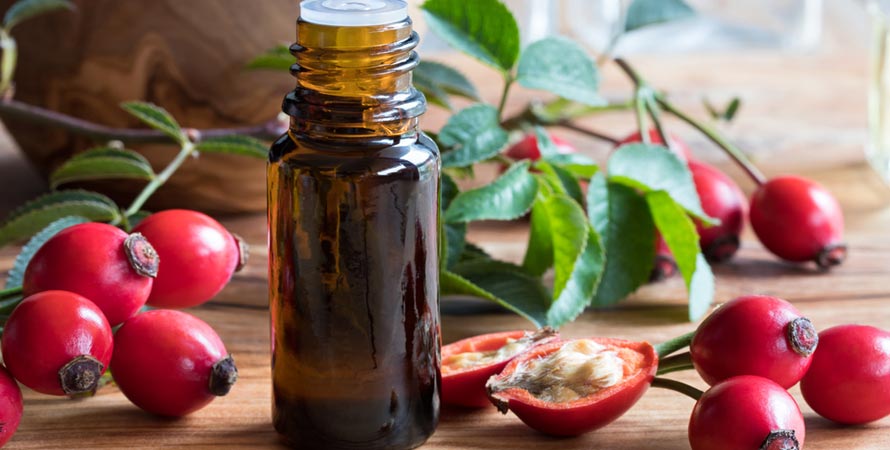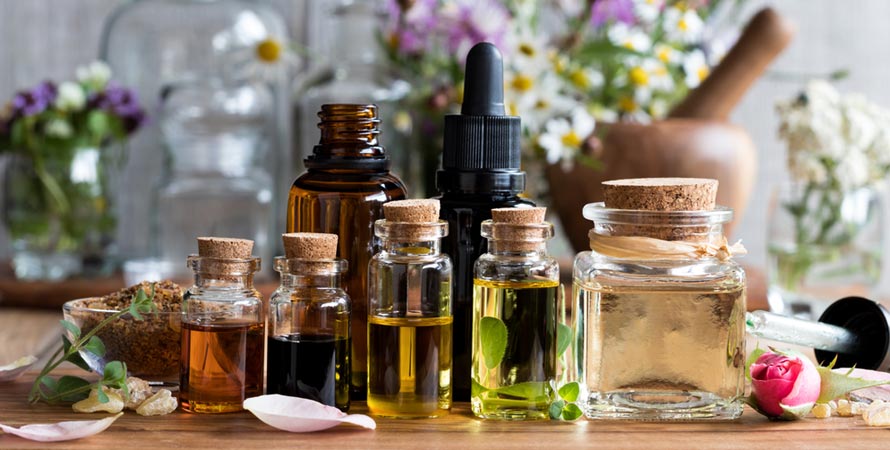10 Best Essential Oils to Incorporate in Your Skin Care Routine

- The centuries-old tradition of using essential oils (EO) is believed to maintain health and treat various ailments and conditions.
- However, according to research, out of 98 essential oils, 88 can heal skin infections.
- Essential oils can be used to treat skin conditions, from acne scars to wrinkles, and their aromatherapy properties provide a sense of calm to your skin.
- Essential oils are all-natural and considered gentle and largely unreactive for your skin, but these are 75 times more potent than dried herbs.
- So, consider properly diluting your essential oil before applying it directly to your skin.
- Dilute in a carrier oil or add a few drops to your regular moisturizer, but make sure you understand the formula before coating your face with these powerful products.
What Are Essential Oils?
Skincare essential oils are volatile and highly concentrated plant extracts made from leaves, flowers, and seeds. These oils contain several natural ingredients that give the plant its “essence” (specific fragrance and flavor). Some may have properties that can treat skin conditions.
The scented liquid is extracted from certain plants using the steam distillation method, which employs heating to purify a liquid. Essential oils are used in the production of medicine, perfumes, food flavorings, and aromatherapy.
Furthermore, these are also a natural alternative to synthetic creams and lotions. This article will help you discover some of the best skincare essential oils to treat certain skin conditions.
Top 10 Must-Have Essential Oils for the Skin
1. Pure Argan Essential Oil
Pure Argan is an antioxidant and vitamin-rich essential oil. The formula is highly nourishing and hydrating, making it the perfect choice for preventing and reducing dry skin and wrinkles. Also, the product comes with a combination of fatty acids and vitamin E that are easily absorbed and give you almost instant effects.
How to Use:
- Use it to naturally moisturize and beautify your face, hair, and nails.
- Include it in the last step of your skincare routine.
- Add a few drops to your moisturizer and body lotion for an extra dewy glow.
2. Lemon Essential Oil
Lemon oil contains a higher concentration of D-limonene that can be amazingly effective when it comes to skincare. This compound is known to help promote circulation, reduce the appearance of wrinkles, and tone the skin. Recent research revealed that D-limonene contains anti-inflammatory and skin-repairing properties.
Vapors of lemon oil also contain antidepressant properties that can significantly affect your mood.

How to Use:
- Use whenever you need an extra boost, or in the morning.
- Add a few drops to your favorite cleanser to make your skin refreshed and hydrated.
- It can be added to baking soda to make your appliances sparkle.
3. Geranium Essential Oil
Geranium oil is beneficial for all skin types, and it is excellent in balancing oil production and skin tone. It has antibacterial properties and a refreshing floral aroma with scents of rose in it, making it a perfect formula for boosting your mood and the oil-balancing effects of any moisturizer.
How to Use:
- It can be used in aromatherapy, by itself, or in combination with other natural fragrances.
- Geranium oil can be taken orally in drop quantities but has a bitter taste.
- You can also add geranium essential oil to mineral water for a moisturizing face mist.
4. Lavender Essential Oil
Lavender is a versatile essential oil for the skin, and it can be used for all skin types, including sensitive and mature skin. Due to its effectiveness in acne and redness, it is often included in DIY body products.

How to Use:
- Add 1-3 drops in hot water for a steam treatment.
- Make your massage oil by diluting EO with a carrier oil at 1-3%.
- For skincare and other uses, dilute with a carrier oil such as olive or almond oil before use.
- Please consult a professional reference source for proposed dilution ratios.
5. Neroli Essential Oil
Neroli is one of the most effective skincare essential oils used to treat mature, aging, devitalized, and sensitive skin types. This oil possesses regenerative properties and can be used as a skin toner to tighten maturing skin.
Neroli EO also contains antibacterial properties and is considered helpful for acne, scarring, and stretch marks, making it a great essential oil for the skin.
How to Use:
- Apply anywhere you want to have tighter, even, and rejuvenated skin.
- Apply twice a day for at least 30-60 days to heal and tighten your skin.
6. Tea Tree Essential Oil
The applications of tea tree oil for skincare are countless. Some of them include its antibacterial and antifungal properties, naming it as the first choice for acne and oily skincare routine.
Tea tree oil is also effective for minor cuts, scrapes, and other skin problems you may experience.

How to Use:
- Dilute three drops of the oil into 2 ounces of witch hazel
- Apply it as a toner throughout the day
- Body lotion, face wash, and moisturizer containing tea tree oil are also worth considering
7. Rosemary Essential Oil
Rosemary oil is supplemented with oxidative protection that helps prevent toxic free radicals from damaging your skin. It also promotes circulation and diminishes inflammation, which works great as an essential oil for the skin.
How to Use:
- Take six drops of rosemary oil and one tablespoon of aloe vera gel
- Mix aloe vera gel and the oil
- Apply it to your entire face and massage for a while.
- Leave it on for 10-15 minutes and then wash.
- Use daily for desired results.
8. Rosehip Essential Oil
Rosehip oil can serve as a great natural moisturizer for your skin, especially your eyes’ moisturizing needs. It comes with antioxidant properties and essential fatty acids that promote cell regeneration, making those crow’s feet and fine lines fade.

How to Use:
- Take one teaspoon of rosehip oil, three teaspoons aloe vera gel, five drops of lavender oil, and five drops of lemon oil.
- Put all the components in a glass container and shake well.
- Regularly massage the blend around your eyes.
- Wash it off in the morning.
9. Ylang Ylang Essential Oil
Ylang-ylang oil is known as a skin preserver for various reasons. Scientific studies have found that this oil contains antioxidants that boost skin renewal by repairing the proteins and lipids in your skin.
These antioxidants have a free radical scavenging potential that prevents signs of aging. Ylang-ylang oil is an essential ingredient of many anti-aging products.
How to Use:
- Take one teaspoon of unrefined coconut oil and 2-3 drops of ylang-ylang oil.
- Put the two oils in your palm and use your finger to mix them.
- Massage all over your face and neck.
- Repeat this daily at night and wash your face the next day.
10. Frankincense Essential Oil
Marks left by wounds and acne make your skin look dull. Frankincense oil works to process tissue remodeling in your skin. Integrate this into your skincare routine.
According to scientific research, the structure of frankincense is a steroid-like pentacyclic triterpene that relieves troubled skin and makes your skin tone balanced.
How to Use:
- Take one tablespoon of unrefined coconut oil and four drops of frankincense oil.
- Mix both oils and store the moisturizer in a glass container.
- Apply twice a day for desired results.
What Are the Other Benefits of Essential Oils?
- Essential oils are widely used in aromatherapy to control stress and anxiety.
- Tea Tree oil contains antimicrobial properties and is used to treat oral thrush, athlete’s foot, and fungal infections like candida.
- Lavender oil’s soothing aroma is believed to improve sleep quality.
- Adding essential oils to food can prolong our shelf life.
- Essential oils can be used in home cleaning products to scent places or freshen up things like laundry.
- Essential oils are an environmentally friendly and safe alternative to artificial mosquito repellents, such as DEET.
Risk Factors Associated with Skincare Essential Oils
- Essential oils can often cause allergic reactions, resulting in a rash or itchiness. In some cases, an allergic reaction can lead to anaphylaxis.
- If you don’t dilute your essential oil for the skin with a carrier oil, it may lead to rashes and irritation.
- Phototoxic skincare essential oils such as lemon oil and other citrus oils may negatively react when exposed to sunlight. Therefore, it is recommended to use such oils at night.
- Skincare essential oils are not suitable for pregnant women, children, and people with high blood pressure or epilepsy. Always speak with your doctor before the application.
- The volatile nature of essential oils may make them degraded when exposed to light and heat. That’s why you’ll always find them in dark bottles. Dark contains may help preserve the benefits of essential oils.
- Lavender, peppermint, tea tree, and ylang-ylang essential oils are most commonly associated with adverse reactions.
- There is no guarantee that some skincare essential oils will entirely improve your skin condition.
Common Misconceptions About Essential Oils

1. Taking essential oils orally helps to prevent a condition
The truth is, health is a holistic process, and taking a particular essential oil isn’t going to ward off common diseases.
2. Essential oils never expire
The truth is essential oils do have shelf lives. However, some oils last much longer than others, and some benefits of essential oils become more powerful with age. It depends on the chemistry of a particular oil.
3. Essential oils are harmless
In reality, although skincare essential oils are considered safe, they can have adverse effects that hurt the skin and should be applied with caution and care.
4. Always look for a therapeutic grade EO
The therapeutic grade is a marketing term brands use for various reasons and not a guarantee of quality. Every authentic essential oil for the skin is therapeutic by nature.
5. Essential oils are in the Bible
Most historians and aromatherapists believe that essential oils weren’t refined enough to produce oils until the 10th century. The Bible had been completed hundreds of years before that. Unfortunately, this misconception seems to be another marketing strategy.
Conclusion
Adding essential oils for the skin into your daily routine may yield several benefits. However, it is always recommended to speak with an expert about your preferred essential oil, whether you’re an old essential oil user or a total amateur.
Additionally, remember to use safe practices, which means diluting your oil with a carrier solution and ensuring it comes from a legitimate source. This is to ensure that the benefits of essential oils are gauged as well as prevent adverse reactions from occurring in the first place.
Deprecated: Function WP_Query was called with an argument that is deprecated since version 3.1.0!
caller_get_posts is deprecated. Use ignore_sticky_posts instead. in /home/healthwebmagazin/skinformulations.com/wp-includes/functions.php on line 6121






